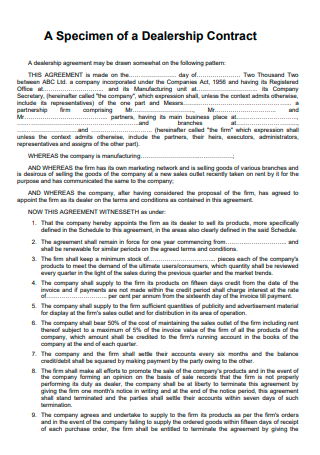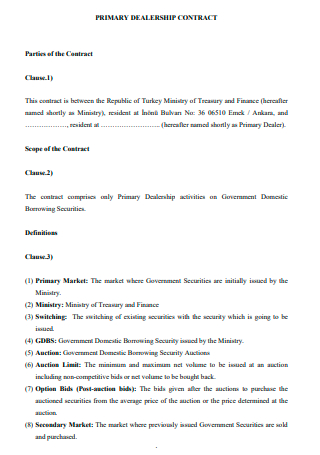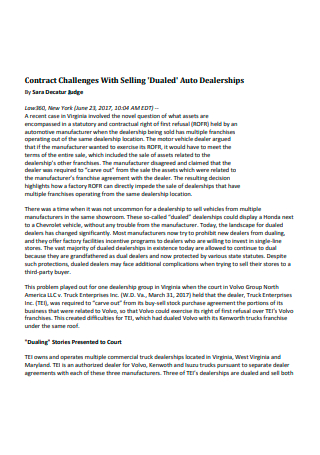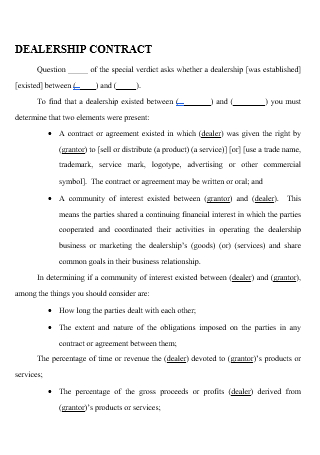3+ Sample Dealership Contract
FREE Dealership Contract s to Download
3+ Sample Dealership Contract
What Is a Dealership Contract?
What Is Dealership?
What Are the Different Types of Dealership Businesses?
What Are the Components of a Dealership Contract?
What Is the Difference Between a Retailer and a Dealer?
How to Write a Dealership Contract?
FAQs
What Is a Master Dealer Agreement?
What Is Dealership Certificate?
What Are the Benefits of Dealerships?
What Is a Dealership Contract?
Dealership Contract means an oral or written agreement, either express or implied, between a supplier and a dealer which provides that the dealer is granted the right to sell, distribute, or service the supplier’s equipment, regardless of whether the equipment carries a trade name, trademark, service mark, logotype, advertisement, or other commercial symbol, and which provides evidence of a continuing commercial relationship between the supplier and the dealer. A dealership contract usually takes place between a dealer and vendor or distributor.
In addition, just like any other agreement or contract, the contract provides an outline of the terms and conditions about the particular type of products or services that is involved in the arrangement. It contains the purpose of the contract, the mode of payment to be used, when the products or goods will be delivered, the duties and responsibilities that each party is expected to follow, and the grounds for the contract to be terminated.
What Is Dealership?
A dealership is a business that is authorized to sell specific goods and these goods are mostly cars or vehicles. A dealership is a legal business regardless if it is a family business or owned by a large corporation. They handle a number of legal documents to ensure that the sale and purchase of their goods or services are according to the law and not against it. Moreover, a dealership is sometimes called a retail distributor. It is similar to a distributorship, except that a dealer usually sells only to the public. Unlike other types of franchisees, including some distributors, a dealer rarely carries a single product line. Even in the auto industry, a major dealer will carry competing products, often on the same site, but these will be differentiated by being each in its own building.
By operating as a dealer for a branded product, the dealership in effect participates, but at second hand, in the producer’s total marketing scheme—enjoying national advertising support, receiving training, and taking advantage of incentive programs. By taking part in dealer groups, dealerships also act as a feedback mechanism for the producer conveying insights gained by dealing directly with the customer.
The Dealer
A dealer acts as a principal in trading for its own account, as opposed to a broker who acts as an agent who executes orders on behalf of its clients. They make markets in securities, underwrite securities, and provide investment services to investors. Dealers are important figures in the market.
Dealer is responsible for the payment of all costs and expenses, including shipping, handling, insurance, brokerage fees, taxes, customs, and other governmental charge incurred or imposed after passage of title as specified in the Terms and Conditions of Sale. Dealer may not, without the consent of their partner, reverse engineer, disassemble, modify or redesign any Product or component part thereof, or use any Product for any purpose other than that for which it is intended, or integrate any Product or component part thereof with any other equipment. Any such actions will render any Product warranties provided by the business partner null and void. Dealer must maintain acceptable end user assistance and problem resolution to the end users of the Products. Dealer agrees that without the prior written permission of the partner, Dealer may sell the Products only to end-user customers and not to other retailers for the intent of resale.
What Are the Different Types of Dealership Businesses?
To know which dealership is most profitable when starting a dealership business, some of the small or start up business ideas for dealership are as follows:
What Are the Components of a Dealership Contract?
There are a lot of things that you can see in a contract and learning about them might just overwhelm you or scare you. Finding out what components are included in a dealership contract will surely help. Here is a list of them below:
Heading/title bearing the words dealership contract; name, address, and contact details of the dealership; name, address, and contact details of the other involved party; products involved in the dealership; particular terms and conditions of the contract; marketing activities involved; obligations of both the dealer and the other party; trademark and trade names to be used; return policy of the agreement; clauses and other terms for termination, as well as the effects of terminating the agreement; rights of both parties in the contract; statement of confidentiality; liabilities of each party; general provisions, like independent contractors and indemnity clauses, the laws that govern the dealership agreement, severability clauses, compliance, and any notices; payment details, which includes the total amount to be paid with taxes and other fees, when payment should be made or the payment schedule, mode of payment, the down payment needed, credit terms, and many more; signature of both parties who are involved in the agreement; date and place where the contract was signed; and name and signature of the witness who was present during the signing or the transaction.
What Is the Difference Between a Retailer and a Dealer?
In a trade, the retailer’s and dealer’s function are different, that is a retailer sells the product to the end-user, and a dealer buys and then sells the product to the consumer. Basically, retailers are at the end position of any business management system, due to which they are the direct representative of the customers. They help the manufacturers to know about the needs and requirements of the customer. They purchase the products at a competitive price from the suppliers and market them according to their benefits. Generally, they buy small quantities of items from a distributor or a wholesaler in order to gain profit, which would coincide with their business objectives. An example of the common retailer in the society is the general shopkeeper, who sells the goods and/or products to respective consumers. Dealers in trade cycle are the one who set the deals of respective goods, products, services and properties. They are basically defined as ‘individual or firm that buys goods from a producer or distributor for wholesaling and/or retail reselling’. They deal with such goods which require large areas to be covered. Distribution of these goods takes place in different areas, places of a country, etc. The manufacturers fix the prices on the goods.
While they perform both the activities of buying and selling, in the market, they are generally known by their product names such as the antique dealer, car dealer, arms dealer, art dealer, property dealer, and just too many to mention. Companies mostly prefer the dealers to sell their products in order to avoid the competition, hence, it is the dealer’s responsibility to sell the company products. They also resell the product or property after a specific time interval.
A dealer is the one who does the work with a motive of profit, which is he generally receives after the transaction of the product or property. Dealers make it easy to sell and purchase the products. They sometimes also act as middlemen between the manufacturer and the consumer.
How to Write a Dealership Contract?
A dealership agreement typically include:
Step 1: Purpose of the Agreement
Details of the good involved in the transaction. The territory of the dealer’s operation.
Step 2: Tenure of the Agreement
May be an indefinite period. If a specific time period, then, provision and terms of renewability.
Step 3: Obligation of the Parties, Which May Include:
Duties of the distributor to provide a percentage of capital for staff. Duties of the dealer to complete the procedure of initiating the dealership within a specific time period. Dealer to not hold back promotion of goods supplied by the distributor.
Step 4: The Procedure of Supply and Return of Goods
Dates of delivery of goods and return of defective goods.
Step 5: Promotion and Training
Regular training to be provided to an employee of the dealers. Material for promotions to be provided to the dealer. Discounts and deals to be conveyed with brochures to the dealer.
Step 6: Invoices and the Mode of Payment
The time period of the invoices. Penalties of any to be levied upon late payment or otherwise. Payment period- monthly, quarterly or otherwise.
Step 7: Any Restrictions Upon the Parties
Restrictions upon transactions with any competitors. Prices of goods, it can be altered by the dealer while selling goods to the final customer. Territorial restrictions; Exclusive dealership or not; and Assignment, delegation by the dealer if allowed.
Step 8: Termination of the Dealership
Notice period. Settlement of accounts upon termination. What terms shall survive the terminated agreement.
Step 9: Scope of Appointment of Sub-Dealers, Agent
The manner in which notices to be served to the parties and on what address.
Step 10: Waiver Clause
For any future breach of the terms by either party or failure on part of the dealer.
Step 11: Details of Warranties
Provided on the goods by the manufacturing companies.
Step 12: Confidentiality Clause
Dealing with business transactions, the technical data, the customer lists, the sales practices, the operational procedures, and practices etc.
Step 13: Clause for Modification of the Agreement, if any Allowed
Which terms may be amended; which terms may be removed; and if any terms may be added.
Step 14: Governing Laws and Jurisdiction
In case of any dispute among the parties involved.
Step 15: Dispute Resolution
Procedure to be resorted to in case of an altercation between parties.
FAQs
What Is a Master Dealer Agreement?
Any program that includes the continuous purchase of contracts from dealers should include a well-written master dealer agreement. This is the contract that sets forth the basic terms of the transaction between the dealer and the finance company. The more important terms include: The Purchase Price.
What Is Dealership Certificate?
A dealership certificate is a legal document where one party grants rights or license to another party to sell its goods or services.
What Are the Benefits of Dealerships?
The benefits of being a dealership or a distributor are many. A franchise is normally able to secure a lower price on goods, giving them greater buying power, than an independent seller would be able to get.
Among the best business ideas, a dealership business can be launched with less effort, rather than starting a new business from scratch. We can say that dealership businesses are profitable and high in demand. Starting a dealership business expands the business reach and customer base. There are several options for dealership business ideas that you can choose from, such as furniture dealership business, clothing business, textile business, health care and beauty products business, and many more if you are looking to start a dealership business, read the steps required, as mentioned in the article, to obtain a dealership. It also increases the revenues and profits of the business. The demand for branded clothes, cards, IT products, and other branded items is high in the market. This makes it a profitable business idea.




